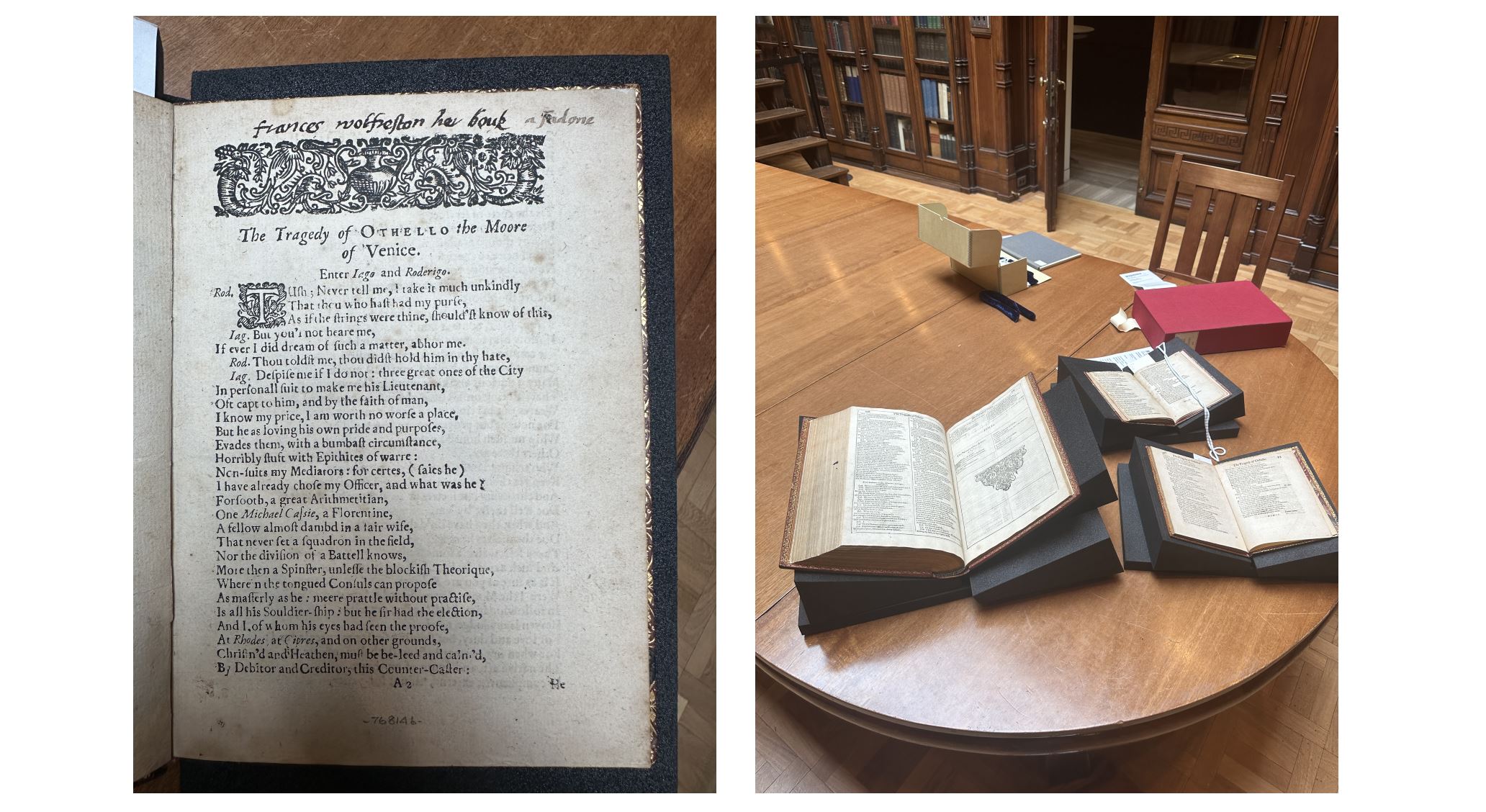
Natalia Pallas and Thalia Graeff participated in a research project titled "Editing Othello" under the mentorship of Dr. Abdulhamit Arvas (Department of English). For this project, Natalia and Thalia compiled a bibliography that includes all editions, illustrations, manuscripts, archival texts, and theatrical performances of this Shakespeare play from its origins in the 1600s to now. This research was supported by the Penn Undergraduate Research Mentoring Program.
Natalia Pallas ('26) is an English major. Read more about her experience with research below!
I was drawn to this project because of my previous experience with the play. I was first introduced to Othello in the class “Shakespeare in Love.” Being tasked with reading 10 of Shakespeare’s plays, Othello was always the most interesting to me. This was because of the characterization of Iago, who to me is such an effective villain, but also the several themes that could be uncovered in this play. I was excited at the opportunity to be able to go in-depth into the play and research it outside of a classroom setting. Throughout these 10 weeks, my research consisted of finding scholarly works, modern film adaptations, and other book editions of the play. It was important for me to engage with this research, because as an English major who is interested in academia, I wanted to see what research in the humanities entails.
The most challenging thing about my research on making a bibliography for Othello is that I was sometimes overwhelmed by how much material there was dedicated to this play. Search results for Othello on several databases garnered pages of results and I wondered how I would be able to look through all of this material and then categorize it. I learned that not every source is a “good” source, and learning how to use filtering tools in these databases helped immensely.
I really enjoyed the connections I made over the summer. Firstly, Professor Arvas was able to clearly explain the expectations of the project and was always available to answer any questions if needed. I also had a research partner, Thalia, who helped make this research less daunting. For some part of my research, I was tasked to go to Van Pelt to see all of the resources we had dedicated to Shakespeare, which is where I met with Mayelin Perez, a bibliographer for the Penn English Department and Theatre Arts and Comparative Literature Programs. She was very helpful in helping me navigate the Franklin Library database. John Pollack, the curator for the Penn Kislak Center for Special Collections, was also very helpful as he informed me of the Furness Library, a library specifically dedicated to Shakespeare, and showed me rare items including the First Folio and some Quartos of Othello.
As someone who was interested in pursuing a career in academia, I am very grateful to have taken part in research that aligns with my interests and helped me understand what a future in academia could look like.
Thalia Graeff ('26) is a History of Art major. Read more about her experience with research below!
I was first drawn to apply to be part of this project because of my interest in theatre, which is something I have been involved with since middle school. Professor Arvas tailored my work to be focused more on the visual and performative histories of the play to combine my interest in theatre with my major in art history. It was incredibly interesting to see how much history can be revealed through tracking the transformation of these visual records of theatre through time.
The most challenging part of this experience was managing my time. While I worked with and gained insights from Professor Arvas, Penn librarians John Pollack and Mayelin Perez, and my research partner Natalia Pallas, much of my portion of the project was fairly independent and required me to set my own smaller deadlines. This independence is reflective of the way research in the humanities is often done, and as Professor Arvas explained at the start of the summer, it is important to balance and organize your time as an independent researcher to make sure you retain a healthy work-life balance. I have always been a procrastinator, especially in school when I have had to write research papers for different classes. However, as this project was much longer and larger in scale, I knew that I had to properly manage my time in order to complete my work by the end of the program.
My favorite part of working on this project was being able to see so many images created about the same subject by different artists, from different time periods, and using different mediums. The medium that interested me the most was prints, as it was both the most popular and most reflective of the historical timeline of the play. As an art history student, I have learned a lot about how prints as a medium have acted as a more accessible art form, and were often used as a tool for communication throughout history. It was interesting to see this in action by looking at the hundreds of prints inspired by Othello. Also, I have been thinking a lot about what subject I want to research for my senior thesis. This project, and specifically the exposure to prints, has inspired me to learn more about print culture as a possible concentration.
Interested in reading more first-hand accounts about undergraduate research? Check out the other experiences featured on our Student News Page and Social Media!
Related Articles
